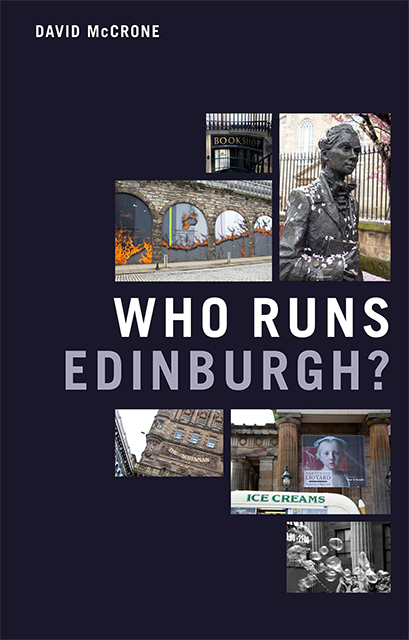Book contents
- Frontmatter
- List of Contents
- Figures and Tables
- Preface
- 1 Who Runs Edinburgh?
- 2 Politics in Edinburgh
- 3 Winners and Losers: The Political Economy of Edinburgh
- 4 Treading Angels: Edinburgh and its Festivals
- 5 Are You One of Us? Status in the City
- 6 What School did You Go To? Education and Status in Edinburgh
- 7 Enlightened City: Cultural Power and University Life
- 8 Developing Edinburgh: Pies in the Sky, Holes in the Ground
- 9 Lost in Leith: Accounting for Edinburgh’s Trams
- 10 Does Anyone Really Run Edinburgh?
- Bibliography
- Index
2 - Politics in Edinburgh
Published online by Cambridge University Press: 25 October 2023
- Frontmatter
- List of Contents
- Figures and Tables
- Preface
- 1 Who Runs Edinburgh?
- 2 Politics in Edinburgh
- 3 Winners and Losers: The Political Economy of Edinburgh
- 4 Treading Angels: Edinburgh and its Festivals
- 5 Are You One of Us? Status in the City
- 6 What School did You Go To? Education and Status in Edinburgh
- 7 Enlightened City: Cultural Power and University Life
- 8 Developing Edinburgh: Pies in the Sky, Holes in the Ground
- 9 Lost in Leith: Accounting for Edinburgh’s Trams
- 10 Does Anyone Really Run Edinburgh?
- Bibliography
- Index
Summary
Let us begin our exploration of the question ‘who runs Edinburgh’ by focusing on formal political power. The point is not that this will provide an easy answer our question, but that it is the obvious place to begin. It is, as it were, necessary in finding an answer, but not sufficient. After all, power may be veiled; formal politics may (or may not) be a front for other, and deeper, interests. It is, however, one of the key games to explore in Norton Long's ecology of games.
We have three ways of assessing formal political power in Edinburgh: who runs the council (our main focus here); who gets elected as MSPs for city seats in the Scottish parliament; and who gets elected as MPs for Edinburgh constituencies at Westminster. At council level, which uses the single transferable vote system (STV), the Scottish National Party shares power with Labour in coalition, and is the senior partner with nineteen council seats following the 2017 election, to Labour's twelve. This is just short of an overall majority in a council of sixty-three members. In fact, the SNP took 27.1 per cent of the popular vote, about half a per cent behind the Conservatives, but the SNP were in a much better position to form a coalition, having been the junior partner with Labour in the previous 2012–17 administration (with eighteen seats to Labour's twenty). The Tories are less attractive coalition partners for any other party with the possible exception of the Liberal Democrats with whom they shared power back in the early 1980s in Edinburgh District.
What of ‘national’ politics? There are two levels to consider: Scottish and British. In terms of the Scottish parliament, elected by another system of proportional representation, the additional member system (AMS), the Nationalists are dominant, holding four of the six Edinburgh constituency seats in 2021, three in 2017, and five of the six in 2012. As far as Westminster seats are concerned, elected by traditional first-past- the- post, there are five Edinburgh seats; in the 2019 UK general election, three were held by the SNP, Edinburgh East, Edinburgh North and Leith, and Edinburgh South-West, all with five-figure majorities, one by Labour (Edinburgh South, also with a five-figure majority), and one by the Liberal Democrats, Edinburgh West, with a 3000 plus majority. In the latter two, non-SNP, seats, the Nationalists are the main challengers.
- Type
- Chapter
- Information
- Who Runs Edinburgh? , pp. 24 - 50Publisher: Edinburgh University PressPrint publication year: 2022



